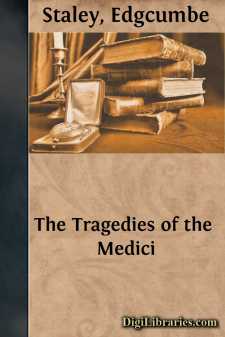Categories
- Antiques & Collectibles 13
- Architecture 36
- Art 48
- Bibles 22
- Biography & Autobiography 813
- Body, Mind & Spirit 142
- Business & Economics 28
- Children's Books 15
- Children's Fiction 12
- Computers 4
- Cooking 94
- Crafts & Hobbies 4
- Drama 346
- Education 46
- Family & Relationships 57
- Fiction 11828
- Games 19
- Gardening 17
- Health & Fitness 34
- History 1377
- House & Home 1
- Humor 147
- Juvenile Fiction 1873
- Juvenile Nonfiction 202
- Language Arts & Disciplines 88
- Law 16
- Literary Collections 686
- Literary Criticism 179
- Mathematics 13
- Medical 41
- Music 40
- Nature 179
- Non-Classifiable 1768
- Performing Arts 7
- Periodicals 1453
- Philosophy 64
- Photography 2
- Poetry 896
- Political Science 203
- Psychology 42
- Reference 154
- Religion 513
- Science 126
- Self-Help 84
- Social Science 81
- Sports & Recreation 34
- Study Aids 3
- Technology & Engineering 59
- Transportation 23
- Travel 463
- True Crime 29
The Tragedies of the Medici
by: Edgcumbe Staley
Description:
Excerpt
CHAPTER I
LORENZO—"Il Magnifico."
GIULIANO—"Il Pensieroso."
"Signori!" "Signori!"
Such was the stirring cry which resounded through the lofty Council Chamber of the famous Palazzo Vecchio that dull December day in the year 1469.
Never had such a title been accorded to any one in Florence, where every man was as good as, if not better than, his neighbour. Foreign sovereigns, and their lieutenants, who, from time to time, visited the city and claimed toll and fealty from the citizens, had never been addressed as "Signori"—"Lords and Masters." The "Spirito del Campanile" as it was called, was nowhere more rampant than in the "City of the Lion and Lily," where everybody at all times seemed only too ready to disparage his fellow.
The cry was as astounding as it was unanimous—"Signori!" "Signori!" "Evviva i due Signori de' Medici!" "Signori!" "Signori!" "Evviva i due figli della Domina Lucrezia." Thus it gathered strength—its importance was emphatic—it was epoch-marking.
"Signori!" "Signori!" was the acknowledgment of the sovereignty of the Medici, made quite freely and spontaneously by the dignified Lords of the Signory, in the name of the whole population of Florence and Tuscany.
* * * * *
Piero de' Medici died on 3rd December 1469, and his interment, which was conducted with marked simplicity, in accordance with his will, was completed that same evening. He had, during his short exercise of power as Capo della Repubblica, given a pageant—"The Triumph of Death," he called it, by way of being his own funeral obsequies—a grim anticipation of the future indeed!
At midnight a secret meeting of citizens was convened, by the officials of the Signoria, within the Monastery of Sant' Antonio by the old Porta Faenza, to debate the question of filling the vacant Headship of the State. Why such a remote locality was chosen is not stated, but it was in conformity with Florentine usage, which, for general and personal security, required secrecy in such gatherings.
More than six hundred—"the flower of the city" as Macchiavelli called them—attended, and upon the proposition of Ridolfo de' Pandolfini, Messer Tommaso Soderini, by reason of seniority of years and priority of importance, was called upon to preside. "Being one of the first citizens and much superior to the others, his prudence and authority were recognised not only in Florence, but by all the rulers of Italy."
The Soderini had, for three hundred years, held a leading position in the affairs of Florence; but they were rivals and enemies of the Medici. Indeed Messer Tommaso's uncle—Ser Francesco—was one of the principal opponents in the city counsels of Cosimo—"il Padre della Patria." Messer Niccolo, his brother, carried on the feud, and was, with Diotisalvi Neroni, Agnolo Acciaiuolo, and others, banished in 1455, for their complicity in the abortive attempt to assassinate Piero de' Medici.
Messer Tommaso, more prescient and prudent, threw in his lot with the Medici, and was chosen by Piero, not only as his own chief counsellor and intimate friend, but as the principal adviser of his two young sons—Lorenzo and Giuliano....


